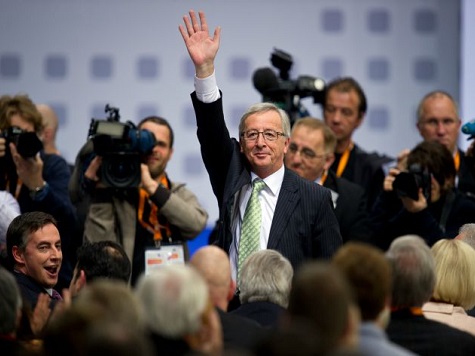Jean-Claude Juncker, the former prime minister of Luxembourg, today was elected as the new president of the European Commission by majority vote in the European Parliament in Strasbourg.
It marked the final triumph of Brussels-insider Juncker, who endured smears as a drunk and questions about his honesty, his abilities and even his German father as part of a British campaign led by Prime Minister David Cameron to stop him getting one of the most powerful posts in the EU.
In what some saw as a coup by the European Parliament, the European People’s Party (EPP) centre-right group in the assembly put forward Juncker’s name before the European Parliamentary elections in May as their lead candidate, using the German word Spitzenkandidat.
When the EPP won most seats in the May elections, leaders of the parliament claimed this gave Juncker the democratic mandate to be the next head of the commission. The European Council, although not obliged by treaty law to accept the EPP’s nominee, succumbed to political pressure and nominated him despite opposition by Cameron.
The votes cast today were secret with just one name on the ballot.
The result was 422 in favour to 250 against out of a total of 729 cast, with 47 abstentions and 10 votes disqualified. Mr Junker needed a qualified majority of 376 votes in the 751-seat assembly.
He will succeed commission president José Manuel Barroso in November.
In a speech to MEPs, Juncker pledged that the commission would be “a political body,” not just a civil service.
When he said he was “defending the single currency because the single currency is protecting Europe, its economy, its citizens,” both applause and cries of “rubbish” were heard.
Before the vote there were speeches by the parliament’s political group leaders, two of whom are British.
Tory MEP Sayed Kamal, leader of the European Conservative and Reformists group, said: “The election which was supposed to end all background deals has resulted in the mother of all background deals,” explaining that his group would not support Juncker’s bid because “We do not subscribe to the process that brought you here, we do not believe you have an EU-wide mandate that stretches across all 28 member states.”
“Members of my group are not yet convinced you are the right man to lead the charge for European reform.”
UK Independence Party MEP Nigel Farage, co-leader of the Europe of Freedom and Direct Democracy Group, said Junker was “on the plus side, a sociable cove with a very much better sense of humour than most people I’ve met in Brussels” and a “there is no question you are a political operator and that you’ve even managed to, in the last couple of weeks as you’ve gone round the political groups, change the mood music a bit. You’ve said you don’t believe in a United States of Europe, you don’t believe in a common European identity. But I have to say I didn’t believe a word of it.”
Criticising the secrecy of the ballot, Mr Farage said “politicians should not vote in secret, but should be held accountable to our own voters.”

COMMENTS
Please let us know if you're having issues with commenting.